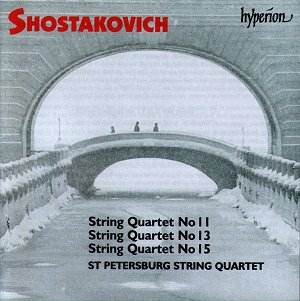This is the penultimate disc in a much-praised cycle
and it can be recommended without reservation to series’ stalwarts and
newcomers alike. Although quite familiar with many of Shostakovich's
orchestral works, I came to this disc as a relatively uninitiated listener
in this repertoire but, expecting music demanding the same sort of concentrated
listening as, say, Bartók's late quartets, was surprised by the
(relative) accessibility of much of it. That is not to say that it in
any sense provides easy listening, because the 13th and 15th
quartets, in particular, are, in their different ways, quite demanding.
The 11th quartet is cast in seven short
sections and, while maintaining his disciplined approach to the inner
logic of quartet writing, the composer pays tribute to the violin, in
particular, as the folk dancing "fiddle" that it originated as. In this
sense, Bartók does spring to mind here, yet Shostakovich's even
greater love of the ironic and grotesque differentiates this music from
that of the great Hungarian. Whatever, this is eminently listenable,
if at times abrasive, and certainly quite removed from the admittedly
unfair and probably lazy stereotype of late Shostakovich as one of unrelenting
bleakness.
The other two quartets here do approximate rather more
closely to that cliché but again, scratch the surface and more
unique, individuality is revealed. The 13th is, in some ways
akin to the at last appreciated music of Benjamin Frankel, serially
organised but in no way abandoning the melodic impulse. Accepted, this
is fairly granitic stuff but this quartet, the only single movement
one in the cycle, offers a remarkable listening experience. At times
there is an apparent descent (no doubt intended) into musical chaos
but no-one appreciative of the late 20th/early 21st
string quartet is likely to be phased by this idiom.
The 15th is very much a valedictory work,
like most of the composer's output in the early 1970s, up to his death.
The excellent booklet notes (by Robert Matthew-Walker) rightly describe
it as having "profound melancholy….akin to a requiem". The six movements,
all marked Adagio, include, unsurprisingly, an elegy and a funeral
march, but there is also so much more here. A lot of this music is reflective
and meditative, with allusions to religious music, and the ebbing Epilogue
is particularly affecting as it acknowledges, again according to the
booklet, "a reposeful acceptance of Fate", no doubt the composer's impending
own.
The recording is produced to the usual, exceptional
Hyperion standards but the playing is something else again. This group
obviously has this music in its collective soul and it shows; like the
best Hungarian quartets playing Bartók or, indeed, our own Maggini
playing the British quartets, there is something profoundly moving (spiritual?)
here that sets this apart from most (any?) cosmopolitan/international/superstar
efforts. A superb achievement that makes me want to hear the rest of
the cycle as a priority.
Neil Horner


